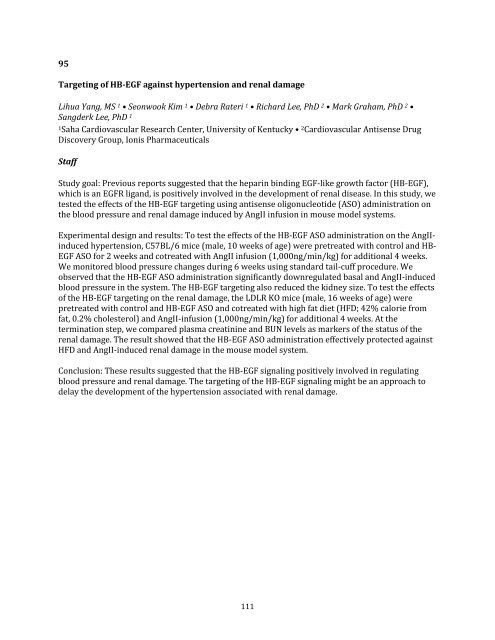2017 Cardiovascular Research Day Abstract Book
Create successful ePaper yourself
Turn your PDF publications into a flip-book with our unique Google optimized e-Paper software.
95<br />
Targeting of HB-EGF against hypertension and renal damage<br />
Lihua Yang, MS 1 • Seonwook Kim 1 • Debra Rateri 1 • Richard Lee, PhD 2 • Mark Graham, PhD 2 •<br />
Sangderk Lee, PhD 1<br />
1Saha <strong>Cardiovascular</strong> <strong>Research</strong> Center, University of Kentucky • 2 <strong>Cardiovascular</strong> Antisense Drug<br />
Discovery Group, Ionis Pharmaceuticals<br />
Staff<br />
Study goal: Previous reports suggested that the heparin binding EGF-like growth factor (HB-EGF),<br />
which is an EGFR ligand, is positively involved in the development of renal disease. In this study, we<br />
tested the effects of the HB-EGF targeting using antisense oligonucleotide (ASO) administration on<br />
the blood pressure and renal damage induced by AngII infusion in mouse model systems.<br />
Experimental design and results: To test the effects of the HB-EGF ASO administration on the AngIIinduced<br />
hypertension, C57BL/6 mice (male, 10 weeks of age) were pretreated with control and HB-<br />
EGF ASO for 2 weeks and cotreated with AngII infusion (1,000ng/min/kg) for additional 4 weeks.<br />
We monitored blood pressure changes during 6 weeks using standard tail-cuff procedure. We<br />
observed that the HB-EGF ASO administration significantly downregulated basal and AngII-induced<br />
blood pressure in the system. The HB-EGF targeting also reduced the kidney size. To test the effects<br />
of the HB-EGF targeting on the renal damage, the LDLR KO mice (male, 16 weeks of age) were<br />
pretreated with control and HB-EGF ASO and cotreated with high fat diet (HFD; 42% calorie from<br />
fat, 0.2% cholesterol) and AngII-infusion (1,000ng/min/kg) for additional 4 weeks. At the<br />
termination step, we compared plasma creatinine and BUN levels as markers of the status of the<br />
renal damage. The result showed that the HB-EGF ASO administration effectively protected against<br />
HFD and AngII-induced renal damage in the mouse model system.<br />
Conclusion: These results suggested that the HB-EGF signaling positively involved in regulating<br />
blood pressure and renal damage. The targeting of the HB-EGF signaling might be an approach to<br />
delay the development of the hypertension associated with renal damage.<br />
111


